PURPOSE This study aimed to extract football coaches’ categories of performance evaluation factors (PEF) and examine the reflective characteristics of the football coaches’ player and casting judgments. METHODS PEF were extracted through an open-ended questionnaire and categorization from 80 AFC C or higher football coaches. Reflection was calculated in player and casting judgments through an analytic hierarchy process. The difference between the football coaches’ player and casting judgments was examined using SPSS 21.0. RESULTS First, the PEF of football coaches were categorized into four general categories: physical intelligence, psychological intelligence, growth potential, and competition intelligence. Second, the importance of football coaches’ player judgments were reflected by the PEF as football intelligence, situation judgment, football talent, tactical understanding, tactical operation, etc. The importance of the casting judgment were reflected by the PEF as tactical understanding, mediative skills, fitness, tactical operation, situation judgment, etc. Third, a statistically significant difference was noted between player and casting judgments. Football coaches tended to value growth potential and talent as sub-factors in the player evaluations. Football coaches’ PEF were aligned with the importance of player and casting judgments in psychological and competition intelligence as sub-factors such as skills, physical, attitude, passion, etc., but differed from physical intelligence and growth potential as sub-factors including mediative skills, physical, football talent, and tactical understanding. CONCLUSIONS In the football coaches’ player evaluations, the idealistic principle centered on growth potential. However, in the casting evaluation, the realistic principle centered on victory takes effect.
PURPOSE This study investigated the effect of non-linear periodization strength training on basic and professional fitness of national cross-country skiers. METHODS The body composition (height, weight, BMI, body fat %), basic physical strength (grip strength, lung capacity), anaerobic power (peak power, average power), graded exercise test (maximum heart rate, running time, VO2max, lactic acid), isokinetic strength (trunk strength), and 1RM (bench press, dead-lift, squat, shoulder press, leg curl, bicep curl, cable triceps extension) of nine national cross-country skiers (male: 5, female: 4) were measured. All analyses were performed using SPSS 25.0, Kruskal-Wallis H tests were applied to observe the changes by training methods. Mann-Whitney U tests were used as Post Hoc. RESULTS The results indicated that running time and VO2max post-test improved compared to that for the pre-test for graded exercise test. The lumbar extension strength of the post-test was higher than that for pre-test. There was no significant difference in other variables. CONCLUSIONS It is suggested that nonlinear periodization strength training can be expected to improve running time, VO2max, and trunk strength for cross-country athletes; however, it does not affect the overall changes.
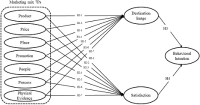
Purpose Limited research has investigated the marketing mix of international sporting events empirically. This study filled this gap by identifying the marketing mix and examined the structural relationships among marketing mix, destination image, satisfaction and revisit intention focusing on foreign spectators of 2019 Gwangju FINA World Championships. Methods The questionnaire was structured in four sections: sporting event marketing mix (seven dimensions and 21 items), host city image (three items), satisfaction (three items) and revisit intention (three items). Analysis of data from 396 foreign spectators in FINA Championships indicated that the proposed model fit the data well. Within a attitude-behavior theoretical framework, this study proposed and tested a structural relationships among the constructs. Results The results of this study presented that (1) product, place, and people in sporting event marketing mix significantly impacted foreign spectators’ destination image, (2) product, price, place, promotion, and physical evidence were appeared to be significant predictors of satisfaction, and (3) destination image and satisfaction had a significant effect on foreign spectators’ revisit intention. Conclusion The findings suggest marketing mix for the international sporting event and its influential mechanism on foreign spectators’ revisit intention. Practically, this study provides important implications for event organizers that can be utilized to develop strategic marketing mix in sporting events to enhance spectators’ destination image, satisfaction, and revisit intention.

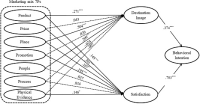
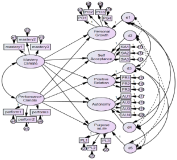
Purpose This study identified the influence of perceived motivational climate on psychological well-being in ballet majors. Methods Participants were 211(male=25, female=186) collegiate students enrolled in ballet department. Measures were The Perceived Motivational Climate in Sport Questionnaire(PMCSQ) and Psychological Well-being Questionnaire. Data were analyzed by using descriptive statistics, reliability test, correlation, and structural equation modeling. Results Results were as follows. First, mastery climate who ballet majors perceive significantly influenced on the five subscales of their psychological well-being: Mastery climate was positively related to personal growth, self-acceptance, positive relation with others, autonomy, and purpose in life. Second, performance climate who ballet majors perceive significantly influenced on the five subscales of their psychological well-being: Performance climate was negatively related to personal growth, self-acceptance, positive relation with others, autonomy, and purpose in life. Model fit indices were acceptable(RMSEA=.070). Conclusion In conclusion, this study indicated that motivational climate who ballet majors perceive was a important situational factor on their psychological well-being.


Sport Imagery Questionnaire of Hall et al.(1998) was developed to investigate the imagery type of athletes objectively. The purpose of this research is to verify validity and reliability of Korean SIQ by using Rasch Model, in order to make up for complement drawback of SIQ which was developed only using factorial analysis. This research conducted first and second questionnaire survey. Second survey was conducted targeting different study participants from those of first survey. The participants of first survey was 265 athletes of Chungcheong Province, and the participants of second survey was 169 athletes of Chungcheong Province. SPSS 21, Winstep 3.62, and AMOS 18 was used for date analysis. The result of Rasch Model verification for the data of first survey revealed that 8 items of SIQ were unfit. Thus, 5 factors and 22 items were determined. 7 point Likert scale was revealed to be a good fit. The result of Confirmatory Factor Analysis for the data of second survey revealed that Construct Validity of 5 factors and 22 items was valid and reliability was high by recording Cronbach’α value .954. External Validity was revealed to be high by showing that correlation between sport confidence and MG-M imagery was high.

This study aims to suggest the guide line for weight category sports(Taekwondo, Judo, Wrestling, Weightlifting, and Boxing) who have to lose weight to pass weigh-in before games. Reference data was collected from RISS, Medline, PubMed, SciELO and effects of short term weight loss on physiological variables(body composition, physical fitness, blood components, oxidative stress and hormone, immune function) were analyzed. Also, weight loss procedures for weight category sports athletes were analyzed in details. The results of the research are as follows: weight category sports athletes prefer short term (3~5 days) weight loss methods (3~5%) with dietary control, sweating and exercise. Physical changes caused by the loss in body weight, fat-free mass, and BMI, however, do not affect body fat percentage. Different changes of physical strength element depend on weight reduction period. In short term weight loss method, anaerobic exercise capacity, muscular strength, and reaction time partially decrease and affect staying power. In contrast, long term weight loss method do not affect aerobic and anaerobic exercise capacity. Furthermore, most of previous studies show that blood component change has negative effect on body water balance, stress-related hormone, and immune function. In conclusion, short term weight loss method negatively affects athletic performance of weight class competition athletic. Therefore, careful long term weight loss methods are recommended with dietetic consideration to prevent dehydration during weight loss period. Excessive weight loss on lightweight athlete should be prevented by institutional basis as well.
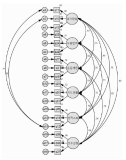
This study was to explore and confirm factors of sport psychology counseling needs in Korean elite coaches. In order to achieve this purpose, 56 elite coaches in Korean Olympic training center at Taereung and Jincheon responded on open-questionnaire and 260 coaches responded on survey. Open-ended questionnaire responses were analyzed by inductive content analysis and collected survey data were analyzed by exploratory factor analysis and confirmatory analysis. The results were as follows: Firstly, sport psychology counseling needs of elite coaches were competition preparation, negative athlete-coach relationship, athlete private problems, performance degradation, pressure on performance result, injury management, team cohesion degradation, motivation, training management, different gender athlete control, athletes drop out, pressure from outside, conflicts with colleagues, neglecting from athletes, feeling of incompetence, emotional control problem, and so on. Secondly, based on these responses, closed-ended questionnaire was developed, surveyed, and analyzed. Exploratory factor analysis illustrated that sports counseling needs of coaches were performance enhancement strategies, unreasonable pressure, negligence on training, coaching stress, competition result stress, conflicts with athletes. Finally, confirmatory factor analysis showed that construct of sport counseling needs illustrated appropriate fit indices values. The results of this study contributed to provide fundamental information on coaching education program and sport psychology counseling program development and application. Consequently, it will help coaches to control their mind at coaching in training and competitions.

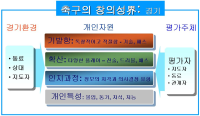
The purpose of this study was to explore a framework of understanding football performance. Researcher review was conducted to organize perspectives for football performance and drew implications as well as drift of football performance based on intelligence approach. Discussions for intelligence had been proceeded in concepts of learning ability, multiple intelligence, successful intelligence, and moral intelligence. Discussions of football performance approaches fitness, skill, and strategies in traditional intelligence aspects. The multiple intelligence perception discusses perspective, mentality, body, and analysis. The successful intelligence perspective deals with creativity, practical intelligence, and football talents. However, specific discussions for moral intelligence have not been progressed yet. FIFA’s social responsibility project and UEFA’s RESPECT campaign reflect that the discussions of football performance develops in a way of the moral intelligence. In European football, issues regarding value, such as RESPECT and against Racism, are currently emerging. Considering the change in the European football, the global football leagues will share the issues related to value in the near future. Given the fact that discussion for intelligence had been proceeded learning ability, multiple intelligence, successful intelligence, and moral intelligence, the moral intelligence will be a main concern in the further football performance discussion. The moral intelligence will be incorporated into football performance evaluations soon. Furthermore, teams and players will strive to place efforts in order for pursuing value and reputation as factors of performance.

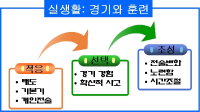





The purpose of this study was to examine the relationship between QTc interval and maximal oxygen consumption(V˙O2max) and body fat distribution in middle-aged men. Abnormal subjects (QTc interval, ≥440ms, n=10) and normal subjects(≤430ms, n=11) using QTc interval based on the Bazzet's equation were involved in the study. After overnight fasting, blood and blood pressure were measured. Abdominal fat area and regional fat compartment were measured by computed tomography(CT) and dual-energy X-ray absorptiometry(DXA), respectively. For V˙O2max, the subjects underwent a maximal graded exercise test on a cycling ergometer. Abnormal group was significantly higher in SBP, basal insulin, HOMA-IR, and leg fat compared with normal. There was a significant relationship(r=.614, p=.03) between QTc interval and V˙O2max in all subjects. Also, partial correlation analysis showed a significant relationship(r=.480, p=.032) between the QTc interval and V˙O2max. Having a QTc interval outside normal range significantly worsened risk parameters for metabolic syndrome, in particular blood pressure and insulin resistance. Moreover, QTc interval was strongly correlated with cardiorespiratory fitness in middle-aged men. This study indicates that further study will be needed to assess the exercise training effects on QTc interval.


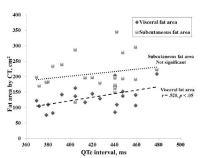
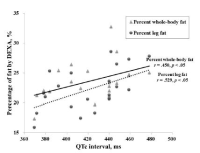
PURPOSE This study developed and applied a group counseling program for university athletes’ career development. METHODS Following Kim’s (2002) procedure for developing group counseling, this program was based on social cognitive career theory and finalized by using two preliminary studies and expert validation evaluation. Afterward, Taekwondo players from University A in Chungcheongnam-do and University B in Seoul were assigned to experimental and control groups, respectively, and then a nonequivalent control group design was conducted. The experimental group was provided with a six-step career group counseling program, including introduction, understanding personal and distal context, enhancing self-efficacy and outcome expectations, developing career interest, deciding on a career, and closing, for ten 45-minute sessions, twice a week. RESULTS First, results of two-way repeated measures ANOVA showed statistically significant changes in career decision self-efficacy (self-appraisal, occupational information, goal selection, planning, and problem-solving) and career attitude maturity (determination, certainty, and independence). Second, analysis of the outcome assessment by session showed the following positive results: consideration about the future after sports retirement, self-understanding, identification of jobs that fit aptitude, improvement of self-efficacy, having a positive mindset when switching careers, confidence in one’s preferred career, exploration into solutions to career barriers, understanding of preferred career, setting specific career goals, and deeper understanding of careers. CONCLUSIONS In sum, these findings indicate that the career counseling program had a positive effect on university athletes’ career development. We hope this study will serve as a catalyst to expand the discussion on retirement from sports and career development.